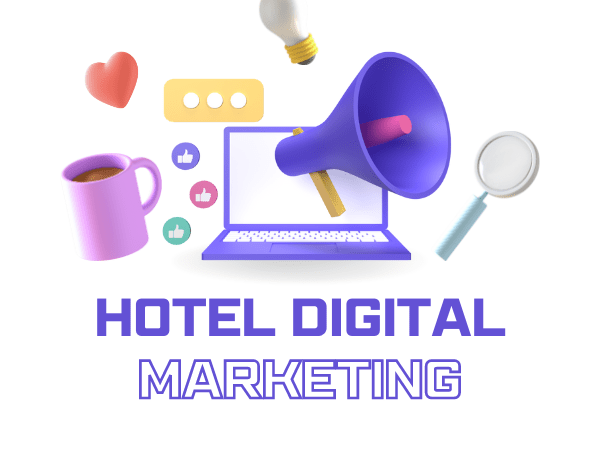In the digital age, a hotel’s online presence is not just an extension of its physical existence but a crucial driver of its success. Digital marketing for hotels has transformed from a luxury to a necessity.
This guide delves into why digital marketing is indispensable for hotels today, how to craft a winning digital marketing strategy, key factors to consider, and essential KPIs to measure its effectiveness.
Table of Contents
Let’s go ahead.
The Importance of Digital Marketing for Hotels
In today’s digital age, a strong online presence is crucial for any business, including hotels. A well-executed hotel digital marketing strategy can help hotels reach a wider audience, increase bookings, and improve guest satisfaction.

In today’s technology-driven world, digital marketing stands as a cornerstone for hoteliers. It offers:
- Broader Reach: Digital platforms extend a hotel’s reach far beyond traditional boundaries.
- Targeted Marketing: It allows for precise targeting of specific demographics.
- Cost-Effectiveness: Compared to traditional advertising, digital marketing often yields a higher ROI.
- Direct Engagement: It enables hotels to engage directly with guests, fostering loyalty.
How to Build a Hotel Digital Marketing Strategy?
Creating an effective digital marketing strategy involves several key steps:
1. Setting Goals
The first step in creating a hotel digital marketing strategy is to set clear and measurable goals. These could include increasing website traffic, boosting online bookings, or improving guest reviews.
2. Identify Your Target Audience
Understanding your target audience (your guests here) is crucial for any marketing strategy.
For a hotel digital marketing strategy, this could include identifying key demographics such as age, location, and travel preferences. Understand who your guests are and what they seek from your hotel.
3. Creating a Compelling Website
A hotel’s website is often the first point of contact for potential guests.
Therefore, it’s essential to create a website that is visually appealing, easy to navigate, and optimized for search engines. Ensure your website is visually appealing, user-friendly, and mobile-responsive.
#OnResTips: Did you know: OnRes provides a hotel website design service to properties like you in order to establish a solid online presence.
4. Leverage SEO
Search engine optimization (SEO) is a crucial component of any hotel digital marketing strategy.
By optimizing your website for search engines, you can increase your visibility and attract more potential guests. Implement SEO best practices to increase your website’s visibility in search engine results.
5. Content Marketing
Use blogs, videos, and infographics to tell your hotel’s story and engage potential guests.
6. Leveraging Social Media Platforms
Social media platforms offer a powerful way to connect with potential guests and promote your hotel.
By creating engaging content and responding to comments and messages, you can build a strong online community around your hotel.
#OnResTips: We have penned down some top tips for social media marketing for hotels.
7. Implementing Email Marketing
Email marketing is a cost-effective way to reach potential guests and keep them informed about your hotel.
By sending regular newsletters and promotional emails, you can keep your hotel top of mind and encourage repeat bookings.
8. Online Reputation Management
Online reviews play a crucial role in the hotel industry. By responding to reviews – both positive and negative – you can show guests that you value their feedback and are committed to improving their experience.
Actively manage your online reviews on platforms like TripAdvisor and Google.
9. Utilizing Online Advertising
Online advertising is a powerful tool for reaching a wider audience and driving more bookings.
By using platforms like Google AdWords and Facebook Ads, you can target specific demographics and increase your visibility online. Consider investing in PPC campaigns for targeted reach.
10. Embracing Mobile Marketing
With the rise of smartphones, mobile marketing has become an essential part of any hotel digital marketing strategy.
This could involve optimizing your website for mobile devices, creating a mobile app, or using SMS marketing.
Factors to Consider While Building Your Strategy
Here are some important factors to consider while building your hotel digital marketing strategy.
- Budget Allocation: Determine how much you can invest in various digital channels.
- Brand Consistency: Ensure your online messaging aligns with your hotel’s brand and values.
- Market Trends: Stay updated with the latest digital marketing trends in the hospitality industry.
- Competitor Analysis: Understand what your competitors are doing and how you can differentiate.
Key Performance Indicators (KPIs) to Measure for Hotel Digital Marketing
To gauge the effectiveness of your hotel digital marketing strategy, monitor these KPIs:
- Website Traffic: The number of visitors to your hotel’s website.
- Conversion Rate: The percentage of website visitors who make a booking.
- Social Media Engagement: Likes, shares, and comments on your social media posts.
- Email Open and Click-Through Rates: How many people are engaging with your email content.
- Online Review Ratings: Average ratings across different review platforms.
- ROI of Paid Advertising Campaigns: The return on investment for your PPC and other paid campaigns.
Frequently Asked Questions
Conclusion
Digital marketing is no longer optional in the hospitality industry; it’s a critical component for success. By crafting a well-rounded strategy, considering key factors, and measuring the right KPIs, hotels can significantly enhance their online visibility, guest engagement, and ultimately, their revenue.
The digital world offers limitless opportunities for hotels to grow and thrive, and tapping into this potential is paramount in today’s competitive landscape.
